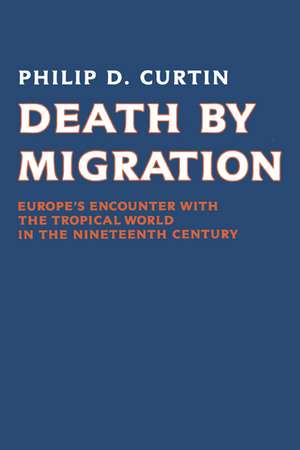Death by Migration: Europe's Encounter with the Tropical World in the Nineteenth Century
Autor Philip D. Curtinen Limba Engleză Paperback – 23 noi 1989
Preț: 203.50 lei
Nou
Puncte Express: 305
Preț estimativ în valută:
38.94€ • 40.61$ • 32.37£
38.94€ • 40.61$ • 32.37£
Carte tipărită la comandă
Livrare economică 20 martie-03 aprilie
Preluare comenzi: 021 569.72.76
Specificații
ISBN-13: 9780521389228
ISBN-10: 0521389224
Pagini: 272
Dimensiuni: 152 x 229 x 16 mm
Greutate: 0.36 kg
Editura: Cambridge University Press
Colecția Cambridge University Press
Locul publicării:New York, United States
ISBN-10: 0521389224
Pagini: 272
Dimensiuni: 152 x 229 x 16 mm
Greutate: 0.36 kg
Editura: Cambridge University Press
Colecția Cambridge University Press
Locul publicării:New York, United States
Cuprins
List of tables, figures, and maps; Preface; List of abbreviations; 1. The mortality revolution and the tropical world: relocation costs in the early nineteenth century; 2. Sanitation and tropical hygiene at mid-century; 3. Killing diseases of the tropical world; 4. Relocation costs in the late nineteenth century; 5. The revolution in hygiene and tropical medicine; 6. The pursuit of disease, 1870–1914; Conclusion; Appendix; Bibliography; Index.
Recenzii
"Curtin has opened an important line of inquiry into the interpretation of imperial and military history. His work is at its most valuable where it touches precisely on these intersecting domains...Economic and imperial historians will value Curtin's comparisons between French and British colonies where sickness made mockery of the `white man's burden,' and sanitary engineering and pure water became, in Daniel Headrick's phrase, the principal 'tools of empire.' World historians of the caliber of McNeill and Crosby will welcome Curtin's exposition of a turning point in the history of humanity's relationship with disease...Few reading his book, and entering the tropics, will want to leave home without it." Bulletin of the History of Medicine
"In Death by Migration, Philip D. Curtin provides yet another major contribution to historical knowledge. By analyzing the mortality rates and causes of death of British and French troops moving into tropical areas over the course of the nineteenth century, he has convincingly demonstrated the contribution of improvements in hygiene and tropical medicine to the mortality revolution. This is a most fascinating study of medical and demographic history, with the broadest implications for the understanding of European imperial expansion." Stanley L. Engerman, University of Rochester
"This book is a carefuly reasoned, meticulously researched exercise in quantitative history. Its generalizations are buttressed with ample tables and graphs." The International History Review
"There is a lot to appreciate in this brief volume. Like Bates's other work, it is written in clear crisp and efficient prose, and it is theoretically rigorous." International Journal of African Historical Studies
"Curtin has written a seminal work that will stimulate scholars to undertake further studies of military mortality in other European colonies and empires. In scope, the work should have an impact comparable to that of his Atlantic Slave Trade: A Census." James L. A. Webb, Jr., African Studies Review
"Philip Curtin's methodology, arguments, and compassion...are ripe for contextual review. For data-impoverished historians in search of an understanding of nineteenth-century public health reform, they provide some key institutional chronologies and some somber food for thought." Jo Gladstone, ISIS
"Philip D. Curtin's book makes important contributions to at least three fields: the history of medicine and public health, historical demography, and the history of European colonialism." American Historical Review
"In Death by Migration, Philip D. Curtin provides yet another major contribution to historical knowledge. By analyzing the mortality rates and causes of death of British and French troops moving into tropical areas over the course of the nineteenth century, he has convincingly demonstrated the contribution of improvements in hygiene and tropical medicine to the mortality revolution. This is a most fascinating study of medical and demographic history, with the broadest implications for the understanding of European imperial expansion." Stanley L. Engerman, University of Rochester
"This book is a carefuly reasoned, meticulously researched exercise in quantitative history. Its generalizations are buttressed with ample tables and graphs." The International History Review
"There is a lot to appreciate in this brief volume. Like Bates's other work, it is written in clear crisp and efficient prose, and it is theoretically rigorous." International Journal of African Historical Studies
"Curtin has written a seminal work that will stimulate scholars to undertake further studies of military mortality in other European colonies and empires. In scope, the work should have an impact comparable to that of his Atlantic Slave Trade: A Census." James L. A. Webb, Jr., African Studies Review
"Philip Curtin's methodology, arguments, and compassion...are ripe for contextual review. For data-impoverished historians in search of an understanding of nineteenth-century public health reform, they provide some key institutional chronologies and some somber food for thought." Jo Gladstone, ISIS
"Philip D. Curtin's book makes important contributions to at least three fields: the history of medicine and public health, historical demography, and the history of European colonialism." American Historical Review
Descriere
This book is a quantitative study of relocation costs among European soldiers in the tropics from 1815 to 1914.











